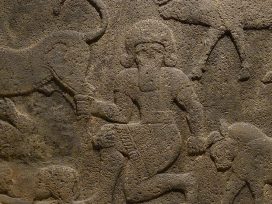Thomas Mann, talking at a conference in New York in 1939 that later became famous, entered the dispute over fees between the well-known Persian poet Firdausi – author of the Shahnameh (Book of Kings) – and the Shah. The Shah had promised Firdausi gold for his poem but then withheld it, seeing that the poet disregarded it. Things of these dimensions, said Mann, can only happen to great epic poets.
All of us learned at school about the debates between Greek scholars over the birthplace of Homer. Equally well known is the discussion about whether Shakespeare himself or Bacon wrote his works. More or less the same thing happened regarding Cervantes in a Balkan country, something maybe you didn’t know. There it is discussed in which country Cervantes was jailed: in Algeria or there, in the Balkans. It seems that the issue of the writer’s imprisonment continues to stir people’s curiosity; I think it is significant that in the Balkans, after all this time, Cervantes’s imprisonment is still spoken about, even if the name of the writer is not known precisely.
Some time ago, an Albanian folklorist wrote a newspaper article about legends and old mediaeval chronicles that retold stories about Cervantes. The stories had passed from one person to another and supported the theory that Cervantes was jailed not in Algeria but in a city between Albania and Montenegro. The scholar based his idea on old people’s stories that concentrate on the fact that the prisoner was a learned person and that a great sum of money was paid for his release. At times, his name is Cervantes, at times Servet or Sarvet.
All the stories coincide at one point: that this prisoner had friends in faraway Spain who wanted to liberate him by any means. The scholar asserts that Cervantes was probably a prisoner in the Balkans, because the Balkan coastline is very ragged and full of caves suitable for pirates. Nevertheless, even if the story is not true, the fact that the illiterate old men of the Balkans preserve in their memory the fate and life of this man is very exciting for a writer. We must not forget that these men retain a lot of dramas in their memory, and that when these stories were born, Cervantes was not published in the Balkans. I think it is very significant that ignorant people keep a writer in their memory – after all, this happens so rarely.
Humanity has a special sensitivity for selecting the people whom it entrusts with the creation of its works and who will give shape to its legends. Although it may seem strange, the link between Cervantes and the old men of the Balkans has an inner logic. An inner logic touches this relation and confirms it. This has to do with the subject that I’ll treat further – the fact that the trip of Don Quixote is not a trip through space, but an inner trip through humanity.
Don Quixote’s trip takes place at the time of important journeys, including the most famous and spectacular in the history of mankind: the discovery of America. It is impossible that a greater journey than this exists in history. All at once, the world, the earth, the globe was twice as big. But a strange thing happened: this endless discovery left no trace on world literature. Nevertheless, the trip of an insane person from one village of Spain to another, a trip that had not the least importance to humanity, that brought it nothing, and perhaps never happened, gives to humanity one of the greatest masterpieces of literature. Is this an objection or is it in the logic of things? I think it’s an objection. Always, when discoveries, important ones, have occurred, the idea has been prevalent that these discoveries would transform literature. The latest ones are the trips, the cosmic discoveries, and especially the fact that man has explored the moon. For many, poetry ceased to exist once the moon, one of poetry’s inspirations, lost its mystery, once man was able to travel there.
We know that this did not happen. Despite the passing of time, the many years that have gone by, Don Quixote’s inner journey belongs to this secret calendar. That is why it has affected world literature more than the invention of the locomotive, more than the discoveries of Christopher Columbus, more than spacecraft. It has to be said that this great character of human history has made few vivid incursions into human life. The life of this character is double, in the hidden life of humanity as well as in the exterior life, in the exterior world of people.
Later, I’ll attempt to explain why this figure has sustained so much damage in coming out into the exterior world. Before this, I’ll allow myself a parenthesis regarding the translation of Don Quixote in a Balkan country, in my country, Albania. It is typical that this character enters literature as a vivid character. Don Quixote was translated in Albanian by the bishop of Albania. This bishop was at war with the next king of Albania. The bishop tried to defeat the monarch. To give himself courage, he translated Hamlet and then Macbeth, and lo and behold, he really did manage to defeat the king. Later, the king defeated the bishop and the situation was overthrown; extremely upset, the bishop went into isolation and started to translate Don Quixote.
In the preface that accompanies the book, the bishop said that Don Quixote would be understood better in the Balkans than in any other country. He believed he saw parallels between Spain’s relation to the wide-open spaces of America and the Balkans’ relation to the Ottoman Empire, even if their fates were opposite. While Spain invaded the great American expanses, the Balkan people were invaded by a force that came from the wide-open spaces.
It is as if Spain were to have been invaded by the American Indians. Nevertheless, the results were more or less the same: the vast Ottoman Empire established adventurous relations with the people of the Balkans. It had a hundred thousand excellent soldiers – very obedient soldiers – but no officers. It needed the Balkan derring-do. This explains why the Ottoman army formed its military elite mainly with Balkan officers, especially Albanians. These officers and mercenaries remained unemployed when the empire disintegrated. And here the bishop finds the parallels between these people and Don Quixote and Sancho Panza, who have not gone to America, but wander here and there and dream of returning to the past.
Around the middle of the twentieth century, the Albanian bishop found the Balkan countries to be full of Don Quixotes; even today he casts his shadow across the peninsula. The figure of Don Quixote is still used by political parties. There is not one political force that has not accused its opponent of being a “Don Quixote”. For seventy years in succession the Communists accused the Western leaders of being Don Quixote. The latter did the same, accusing the Stalinists of being Don Quixote. And the story continues. A few weeks ago, during the French presidential election campaign, I heard a certain Phillippe de Villiers being accused of being a Don Quixote in front of the television cameras. As you see, Don Quixote is always the loser, because the politicians who use his name are not on his level and have not a bit of his nobility.
This is a characteristic of one thousand years of humanity. I believe that the two characters of literature and the world, Prometheus and Don Quixote, shared a common fate. They were mended, changed, reformed by humanity. At first sight it seems a great honour that all humanity participates in remaking a character. But this change or amendment can be made for good or bad. In the case of Prometheus, the character won, in the case of Don Quixote it lost. It is very uncommon, in both cases, that humanity is a co-author with the writers. I’ll try to explain this in a simple way.
Let’s take Prometheus. Prometheus as we know him today is not the same as that created by the sages or by Aeschylus. Prometheus was enriched by all of humanity. Originally, he was a far more complicated character than the one we know today. Prometheus managed to negotiate with Zeus, something that the large part of humanity does not know, and does not want to know. It has made a correction to the character. In one word, it has created a more heroic Prometheus.
As I mentioned above, with Don Quixote the contrary happens: he loses nobility insofar as he is compared with mediocre characters. Schiller said that he imagined the chorus of the classical tragedies as a protective wall, a wall that protects art from the interference of the people. According to him, the participation of the Greek spectators in the theatre would have destroyed that. Some Communist leaders, especially Mao Zedong, tried to destroy this wall under the demagogic slogan that all people must participate in art. This was in reality a way to destroy art among the mass of so-called authors. Certainly, people keep art alive; but it is one thing to keep art alive and another thing to intervene to adjust, mend, and reform it. However, great characters exist and humanity has intervened to change them, precisely because of their popularity.
On the other hand, there are great characters such as Shakespeare’s Macbeth, who has never turned into a popular figure in the world. Strangely enough, this happened with his wife, Lady Macbeth, who in recent years has been used as a comparison for the wives of some Communist leaders, especially for Jiang Qing, the widow of Mao Zedong, and Elena Ceausescu.
This shows that there are great works of humanity, such as Macbeth, Faust, The Brothers Karamazov, and so on, whose characters belong only to art. Other characters, such as Prometheus or Don Quixote, get out into the world; because of this they face a very difficult test. I believe that Don Quixote is still an unexplained character. It is necessary to make an attempt, a great attempt, to place him in the position that he merits. It cannot be permitted that Don Quixote be used in political discussions. The real world history, that one that interests literature and to which Don Quixote belongs, is its inner history. Passing from one world to the other, like Don Quixote, may have dramatic consequences.






